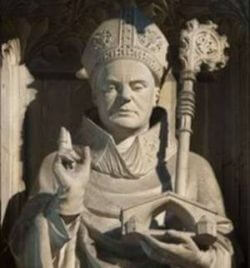
St. Swithin, Winchester Cathedral
Today is Saint Swithin’s Day, a Roman Catholic feast day dedicated to the ninth-century Saxon Bishop of Winchester. (Spellings of his surname have varied. Swithin is correct in modern English, while Swithun was the spelling of choice in Old English. In the original Saxon language, according to Butler’s The Lives of the Saints, it was spelled Swithum.) He was, in fact, never sainted.
Swithin’s name has been associated with the weather for several centuries. The following Elizabethan rhyme, still well-known in the British Isles, explains:
St. Swithin’s day if thou dost rain
For forty days it will remain
St. Swithin’s day if thou be fair
For forty days ’twill rain nae mair.
Before the bishop died on July 2, 862, he asked to be buried outside so he would be trodden upon and the rain could fall on his grave. While the particulars of this story cannot be confirmed, his body was buried outside in front of the west door of the Saxon Old Minster. Visitors can see its outlines, now traced in brick.
Being left out in the elements was considered a terrible indignity by the Church. According to folklore, nine years after his death, workers attempted to dig up his grave but were met with a torrential downpour that swamped the proceedings. The heavy rains lasted for forty days, signaling Swithin’s disapproval.
On July 14, 971, it appeared that Swithin had changed his mind. The weather remained fine as his body was exhumed and “translated” to a shrine within the cathedral. On October 30, 974, his bones, called relics, were moved once again, this time to a jewel-encrusted gold and silver feretory platform behind the altar, a gift from Edgar, King of Wessex.
His head was moved to a separate locked compartment on the altar, where it remained until 1006, when Alphege was elevated from Bishop of Winchester to Archbishop of Canterbury and took it with him to his new post. Other parts of his skeleton were probably divided among several shrines over the following years. (The Second Council of Nicaea had decreed in 787 that every altar should contain a relic, so bones were often split up to make sure every church had at least one.)
Norman invaders razed the church and built a larger cathedral on the grounds. On July 14, 1093, Swithin’s bones—his relics—were translated to a shrine behind the new altar. A tunnel called the Holy Hole was dug so pilgrims could crawl directly under his bones, the better to receive their rumored miraculous healing powers.

Winchester Cathedral
In the early 16th century, King Henry VIII seized control of the Roman Catholic Church, stood in judgment of “clerical abuses” such as excommunication, forbade appeals to the Pope, and declared himself head of the Church of England. In the predawn hours of September 21, 1538, the king’s men entered Winchester Cathedral, destroyed the shrine, and stole the platform. It was melted down a couple of years later. A builder filled in the Holy Hole.
In spite of his moniker, Saint Swithin was never officially canonized by the pope. (That practice wasn’t introduced until two centuries later.) The Royal Observatory in Greenwich Park, London, measured rainfall between 1841 through 1860 and found that the highest number of rainy days occurred when July 15th had been dry. In other words, his feast day is no more predictive than Groundhog Day.
Although nothing remains of the shrine today, those who make the pilgrimage to Winchester Cathedral will see the modern-day memorial and have the chance to walk in the footsteps of more than a millennium of history. We think Saint Swithin would approve.
 Today is National Hot Dog Day, according to the National Hot Dog and Sausage Council (NHDSC), an august body created by the North American Meat Institute, which has declared July to be National Hot Dog Month.
Today is National Hot Dog Day, according to the National Hot Dog and Sausage Council (NHDSC), an august body created by the North American Meat Institute, which has declared July to be National Hot Dog Month.
 Today is National Personal Chef Day, created by the
Today is National Personal Chef Day, created by the 

